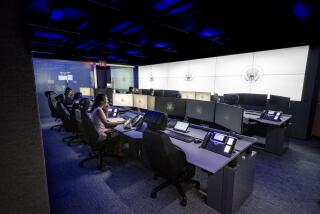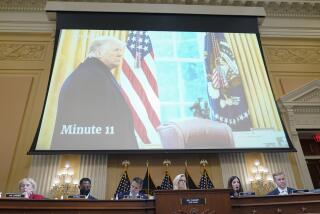Bush Strives to Stay Above the Fray : Presidency: The commander-in-chief’s wartime style most resembles that of Franklin D. Roosevelt.
- Share via
WASHINGTON — More than once over the past week and well before dawn, a tall, solitary figure and his two dogs could be seen walking the south grounds of the White House.
Awakened by the telephone and unable to go back to sleep at 4 a.m. or so, the President of the United States slipped on a coat against the January chill and went for a stroll, spaniels Millie and Ranger at his heels, before heading over to the Oval Office.
George Bush has dealt with personal sorrows. He has handled professional setbacks. But “he’s never had to handle things like this before,” said a longtime friend referring to Bush’s burdens as commander-in-chief of a nation at war.
He’s managing it in typical Bush fashion, according to those watching him during the first week of the Persian Gulf War.
He is asking questions about the details of the allied and Iraqi operations, making the maximum use of his telephone, and then letting the war plan run its course--standing by all the while to put out a diplomatic brush fire.
And, on weekends, he is playing “walleyball” at Camp David.
With not much more than history as a guide, each modern President has had to learn how to cope with the demands and tensions of international crises or war. And each has managed the task differently.
Crisis or not, Ronald Reagan managed to slip out of the Oval Office most days by 5 p.m., turning the details of a military operation over to his generals. “Reagan,” one of his aides said, “did not ask questions.”
Lyndon B. Johnson, working all hours of the day and night, took charge of everything, right down to picking bombing targets in Vietnam. Consumed by the failing effort in Vietnam, he once excused himself from the dinner table saying, “I’ve got to go to Da Nang,” presidential historian James David Barber has written.
Neither model appeals to Bush.
Although he said before taking office that he most wanted to emulate the management style of Dwight D. Eisenhower, his wartime role resembles that of Franklin D. Roosevelt.
Roosevelt, wrote the late columnist Joseph Alsop, avoided the detailed command decisions of his wartime counterpart, Winston Churchill, “but he still required to be continuously informed in much detail, and he still kept all the major threads in his own hands, straightening out a kink or tangle whenever one appeared.”
Bush, too, is a commander-in-chief who tries to stay above the minutiae of the fray while remaining in tune with it. It is, so far, a barely tested model faced with no apparent disasters or even serious management setbacks.
“He’ll ask how the radar system works. How reliable is it? How do the Patriots pick up their targets?” said White House Press Secretary Marlin Fitzwater. It’s been several days, however, since Bush picked up the telephone to direct his questions at Gen. H. Norman Schwarzkopf, the commander of U.S. troops in the gulf, Fitzwater said.
For Bush, nursing a cold, Wednesday’s schedule was typical: There were few events on his public schedule--he met with the president of the Mongolian Peoples Republic, Punsalmaagiin Orchirbat --and most of the day was devoted to the war.
The dozens of telephone calls Bush might make in a day have tapered off; friends report they haven’t heard from him since the war began a week ago. There is, said Fitzwater, “no time for idle conversation.”
“He’s been a pretty serious person; not too much of the teasing that’s been a trademark of his character,” the spokesman said.
Since making the momentous decision to begin the battle for Kuwait, Bush has faced few issues requiring a presidential decision, Fitzwater said. The notable exceptions have been the diplomatic efforts with Israel as Iraq rained Scud rockets down on Tel Aviv and Haifa last Friday and Saturday.
When the second round of missiles hit, Fitzwater said, National Security Adviser Brent Scowcroft called the President, who was at Camp David, the presidential retreat in Maryland’s Catoctin Mountains. It was 3 a.m. The immediate concern was whether Israeli Prime Minister Yitzhak Shamir would launch a retaliatory raid on Iraq.
The President, the spokesman said, “immediately picked up the phone from his bed to call Shamir to reassure him. It was spontaneous.”
About eight hours later, at a meeting with his advisers, Bush kicked around the idea that Deputy Secretary of State Lawrence S. Eagleburger might make a quick trip to Jerusalem, as a further reassurance of the United States’ commitment to the defense of Israel.
When someone in the room suggested Shamir might not welcome the envoy, Bush said, “Why don’t I ask him?”
He walked to a telephone in the corner and five minutes later the visit was arranged, in the second President-to-prime minister call that day. The President called Shamir again at midnight Tuesday, after another--and more damaging--Scud attack.
Typically, Bush receives a briefing each morning from Scowcroft, who reviews “the kinds of missions that were generally a part of the strategy to be carried out that day,” Fitzwater said.
“He doesn’t get a whole stack of charts . . . of every target,” the spokesman said. “For one thing, there are so many of them. I mean, there’s hundreds of targets.”
As has been the case throughout his two years in office, Bush has spent much of his time during the past week reacting to the problems that land on his desk--keeping in touch with the developments in the Middle East via television and “pieces of paper” coming up to him from the White House’s crisis-monitoring situation room one floor below the Oval Office. In this age of instant communications, the televised reports from the rear of the war front often arrive first.
The television, Fitzwater said, is “just on all the time” in the study Bush uses adjacent to the Oval Office.
His normally full public schedule is remarkably void of official appointments.
Fitzwater did not quarrel with the suggestion that the war is occupying as much as 70% to 80% of Bush’s time. Much of the remaining time is spent on matters that routinely occupy a President each January: the State of the Union address, which Bush is scheduled to deliver next Tuesday, and the final decisions on the fiscal 1992 federal budget, which will be delivered to Congress in two weeks.
In less stressful times, the President each day shifts from issue to issue, meeting to meeting, activity to activity. In times of crisis, he narrows his scope and directs his energy, according to a longtime aide.
“The tougher things get, the more focused and serene he gets. It’s holding to form in this case,” the source said.
Over the past week, Bush has left the White House twice--to spend the weekend at Camp David, and, Wednesday evening, to speak to the Reserve Officers Assn. in Washington.
But even at Camp David, which was built as a wartime retreat for Roosevelt, who called it Shangri-La, the President is rarely at rest.
For Bush, according to an aide, the time spent away from the war is, in a sense, as important as the time he spends on it. The hectic pace of travel he kept up all autumn has come to a halt. He has not been aboard Air Force One since Dec. 8, a stay-at-home record for this President. But he has routinely made the 30-minute helicopter flight to Camp David nearly every weekend since then as he seeks a regular period of relaxation and recreation away from the confining atmosphere of the White House.
And the time he spends with his guests--House Speaker Thomas S. Foley (D-Wash.) and his wife joined the Bushes this past weekend--is as important as the time the President spends with his advisers.
“He has a tendency, even if he goes away for a weekend, he doesn’t want to be alone. If he wants to play checkers, they’ll play checkers. If he wants to talk about dogs and hunting, he’ll talk about dogs and hunting,” said a Bush aide, explaining that his boss likes to relax with people who won’t just talk shop.
More to Read
Get the L.A. Times Politics newsletter
Deeply reported insights into legislation, politics and policy from Sacramento, Washington and beyond. In your inbox twice per week.
You may occasionally receive promotional content from the Los Angeles Times.










